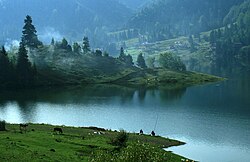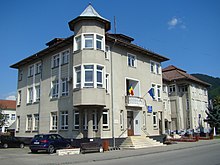| This article needs additional citations for verification. Please help improve this article by adding citations to reliable sources. Unsourced material may be challenged and removed. Find sources: "Bistrița-Năsăud County" – news · newspapers · books · scholar · JSTOR (September 2015) (Learn how and when to remove this message) |
County in Nord-Vest, Romania
| Bistrița-Năsăud County Județul Bistrița-Năsăud | |
|---|---|
| County | |
 Colibița Lake, Bistrița-Năsăud County Colibița Lake, Bistrița-Năsăud County | |
 Coat of arms Coat of arms | |
 Location of Bistrița-Năsăud County in Romania Location of Bistrița-Năsăud County in Romania | |
| Country | |
| Development region | Nord-Vest |
| Historic region | Transylvania |
| Capital city (Reședință de județ) | Bistrița |
| Government | |
| • Type | County Council |
| • President of the County Council | Emil Radu Moldovan [ro] (PSD) |
| • Prefect | Teofil-Iulian Cioarbă [ro] |
| Area | |
| • Total | 5,355 km (2,068 sq mi) |
| • Rank | 26th in Romania |
| Population | |
| • Total | 295,988 |
| • Rank | 32nd in Romania |
| • Density | 55/km (140/sq mi) |
| Time zone | UTC+2 (EET) |
| • Summer (DST) | UTC+3 (EEST) |
| Postal Code | 42wxyz |
| Area code | +40 x63 |
| Car Plates | BN |
| GDP | US$3.730 billion (2024) |
| GDP per capita | US$12,601 (2024) |
| Website | County Council County Prefecture |
| The developing regions of Romania have no administrative role, but were formed in order to manage funds from the European Union as of 2007, Romanian prefects are not politicians, but public functionaries. They are not allowed political party membership, and are banned from political activity for six months after resigning (or being excluded) from the public functionaries' corps. w, x, y, and z are digits that indicate the city, the street, part of the street, or even the building of the address x is a digit indicating the operator: 2 for the former national operator, Romtelecom, and 3 for the other ground telephone networks used on both the plates of the vehicles that operate only in the county limits (like utility vehicles, ATVs, etc.), and the ones used outside the county | |
Bistrița-Năsăud (Romanian pronunciation: [ˈbistrit͡sa nəsəˈud] ) is a county (județ) of Romania, in Transylvania, with its capital city at Bistrița.
Name
In Hungarian, it is known as Beszterce-Naszód megye, and in German as Kreis Bistritz-Nassod. The name is identical with the county created in 1876, Beszterce-Naszód County (Romanian: Comitatul Bistrița-Năsăud) in the Kingdom of Hungary (the county was recreated in 1940 after the Second Vienna Award, as it became part of Hungary again until 1944). Except these, as part of Romania, until 1925 the former administrative organizations were kept when a new county system was introduced. Between 1925–1940 and 1945–1950, most of its territory belonged to the Năsăud County, with smaller parts belonging to the Mureș, Cluj, and Someș counties.
Geography
 AB
AR
AG
BC
BH
BN
BT
BV
BR
BZ
CS
CL
CJ
CT
CV
DB
DJ
GL
GR
GJ
HR
HD
IL
IS
IF
MM
MH
MS
NT
OT
PH
SM
SJ
SB
SV
TR
TM
TL
VS
VL
VN
B
AB
AR
AG
BC
BH
BN
BT
BV
BR
BZ
CS
CL
CJ
CT
CV
DB
DJ
GL
GR
GJ
HR
HD
IL
IS
IF
MM
MH
MS
NT
OT
PH
SM
SJ
SB
SV
TR
TM
TL
VS
VL
VN
B
The county has a total area of 5,355 km (2,068 sq mi). One third of this surface represents the mountains from the Eastern Carpathians group: the Țibleș, Rodna, Bârgău, and Călimani Mountains. The rest of the territory represents the North-East side of the Transylvanian Plateau.
The main river crossing the county is the Someșul Mare. On the Bistrița River there is a big dam and a lake.
Neighbours
- Suceava County in the East.
- Cluj County in the West.
- Maramureș County in the North.
- Mureș County in the South.
Demographics
According to the 2021 census, the county had a population of 295,988 and the population density was 55.3/km (143.2/sq mi).
Ethnic composition of Bistrița-Năsăud County (2021)
Romanians (91.63%) Romani (4.11%) Hungarians (4.08%) Germans (Transylvanian Saxons) (0.10%) Others (0.18%)Religious composition of Bistrița-Năsăud County (2021)
Romanian Orthodox (82.45%) Pentecostals (9.04%) Reformed (3.50%) Greek Catholics (1.58%) Roman Catholics (0.88%) Baptists (0.68%) Others (1.44%) Irreligious,atheist and agnostic (0.42%)| Year | County population |
|---|---|
| 1948 | 233,650 |
| 1956 | 255,789 |
| 1966 | 269,954 |
| 1977 | 286,628 |
| 1992 | 327,238 |
| 2002 | 311,657 |
| 2011 | 277,861 |
| 2021 | 295,988 |
Politics
The Bistrița-Năsăud County Council, renewed at the 2020 local elections, consists of 30 counsellors, with the following party composition:
| Party | Seats | Current County Council | ||||||||||||||
|---|---|---|---|---|---|---|---|---|---|---|---|---|---|---|---|---|
| Social Democratic Party (PSD) | 14 | |||||||||||||||
| National Liberal Party (PNL) | 12 | |||||||||||||||
| People's Movement Party (PMP) | 4 | |||||||||||||||
Administrative divisions




Bistrița-Năsăud County has 1 municipality, 3 towns, and 58 communes.
- Municipalities
- Bistrița – capital city; 78,877 (as of 2021)
- Towns
- Communes
- Bistrița Bârgăului
- Braniștea
- Budacu de Jos
- Budești
- Căianu Mic
- Cetate
- Chiochiș
- Chiuza
- Ciceu-Giurgești
- Ciceu-Mihăiești
- Coșbuc
- Dumitra
- Dumitrița
- Feldru
- Galații Bistriței
- Ilva Mare
- Ilva Mică
- Josenii Bârgăului
- Leșu
- Lechința
- Livezile
- Lunca Ilvei
- Maieru
- Matei
- Măgura Ilvei
- Mărișelu
- Miceștii de Câmpie
- Milaș
- Monor
- Negrilești
- Nimigea
- Nușeni
- Parva
- Petru Rareș
- Poiana Ilvei
- Prundu Bârgăului
- Rebra
- Rebrișoara
- Rodna
- Romuli
- Runcu Salvei
- Salva
- Sânmihaiu de Câmpie
- Șieu
- Șieu-Odorhei
- Șieu-Măgheruș
- Șieuț
- Șintereag
- Silivașu de Câmpie
- Spermezeu
- Șanț
- Târlișua
- Teaca
- Telciu
- Tiha Bârgăului
- Uriu
- Urmeniș
- Zagra
People
Natives of the county include:
See also
- Former Beszterce-Naszód County of the Kingdom of Hungary
- The Via Transilvanica long-distance hiking and biking trail, which crosses the county
References
- "Rezultate definitive: Caracteristici etno-culturale demografice". Recensamantromania.ro. Retrieved 28 July 2023.
- "Populația la recensămintele din anii 1948, 1956, 1966, 1977, 1992, 2002 și 2011" (PDF) (in Romanian). National Institute of Statistics. Archived from the original (PDF) on 22 September 2006. Retrieved 3 January 2018.
- "Rezultatele finale ale alegerilor locale din 2020" (Json) (in Romanian). Autoritatea Electorală Permanentă. Retrieved 2 November 2020.
47°08′20″N 24°30′01″E / 47.1389°N 24.5003°E / 47.1389; 24.5003
Categories: